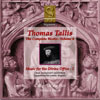Tallis - Music for the Divine Office, Volume 1
Though Tallis never fails to delight, this disc is less than the sum of its parts
View record and artist detailsRecord and Artist Details
Composer or Director: Thomas Tallis
Label: Signum
Magazine Review Date: 4/2000
Media Format: CD or Download
Media Runtime: 67
Mastering:
DDD
Catalogue Number: SIGCD010

Tracks:
| Composition | Artist Credit |
|---|---|
| Hodie nobis caelorum Rex |
Thomas Tallis, Composer
Alistair Dixon, Conductor Chapelle du Roi Thomas Tallis, Composer |
| Salvator mundi, salva nos I |
Thomas Tallis, Composer
Alistair Dixon, Conductor Chapelle du Roi Thomas Tallis, Composer |
| Quod chorus vatum |
Thomas Tallis, Composer
Alistair Dixon, Conductor Chapelle du Roi Thomas Tallis, Composer |
| Videte miraculum |
Thomas Tallis, Composer
Alistair Dixon, Conductor Chapelle du Roi Thomas Tallis, Composer |
| In pace in idipsum |
Thomas Tallis, Composer
Alistair Dixon, Conductor Chapelle du Roi Thomas Tallis, Composer |
| Dum transisset Sabbatum |
Thomas Tallis, Composer
Alistair Dixon, Conductor Chapelle du Roi Thomas Tallis, Composer |
| Jesu salvator saeculi |
Thomas Tallis, Composer
Alistair Dixon, Conductor Chapelle du Roi Thomas Tallis, Composer |
| Sermone blando angelus |
Thomas Tallis, Composer
Alistair Dixon, Conductor Chapelle du Roi Thomas Tallis, Composer |
| Jam Christus astra ascenderat |
Thomas Tallis, Composer
Alistair Dixon, Conductor Chapelle du Roi Thomas Tallis, Composer |
| Loquebantur variis linguis |
Thomas Tallis, Composer
Alistair Dixon, Conductor Chapelle du Roi Thomas Tallis, Composer |
| Magnificat |
Thomas Tallis, Composer
Alistair Dixon, Conductor Chapelle du Roi Thomas Tallis, Composer |
Author: mberry
Tallis is one of those composers of whom one never tires: fresh discoveries are made at each new listening. The fourth volume of the complete works is no exception. Together with its future companion, Volume 5, it presents settings of texts from the Divine Office: here we have five Vespers responsories, those for Christmas, Purification, Easter and Pentecost, the well-known Compline In pace, five Office hymns and an early setting of the Magnificat, based on the traditional Mode I (Dorian) faburden tenor.
The liturgical chant throughout plays a large and integral part. The problem is therefore to match up the excellence of each section of the performance, not only the polyphony. Chapelle du Roi, new to the field, had a unique opportunity to put into practice what has been discovered most recently about how the chant was performed in the time of Tallis. Had they thought more carefully about this they could have achieved a much better balance between the alternating sections. Disappointingly, the long sections of chant in the responsories tend to sound hurried and apologetic, with little sense of line or direction. The hymns are rather more successful in this respect, because there is some attempt at convergence of tempo between sections. But why not introduce an occasional metrical interpretation, as suggested by Nick Sandon in his excellent note, and indeed by Tallis's own polyphony? And why avoid the flattened seventh in Quod chorus vatum, since it features so unmistakably in all the polyphonic strophes?'
The liturgical chant throughout plays a large and integral part. The problem is therefore to match up the excellence of each section of the performance, not only the polyphony. Chapelle du Roi, new to the field, had a unique opportunity to put into practice what has been discovered most recently about how the chant was performed in the time of Tallis. Had they thought more carefully about this they could have achieved a much better balance between the alternating sections. Disappointingly, the long sections of chant in the responsories tend to sound hurried and apologetic, with little sense of line or direction. The hymns are rather more successful in this respect, because there is some attempt at convergence of tempo between sections. But why not introduce an occasional metrical interpretation, as suggested by Nick Sandon in his excellent note, and indeed by Tallis's own polyphony? And why avoid the flattened seventh in Quod chorus vatum, since it features so unmistakably in all the polyphonic strophes?'
Discover the world's largest classical music catalogue with Presto Music.

Gramophone Digital Club
- Digital Edition
- Digital Archive
- Reviews Database
- Full website access
From £8.75 / month
Subscribe
Gramophone Full Club
- Print Edition
- Digital Edition
- Digital Archive
- Reviews Database
- Full website access
From £11.00 / month
Subscribe
If you are a library, university or other organisation that would be interested in an institutional subscription to Gramophone please click here for further information.





